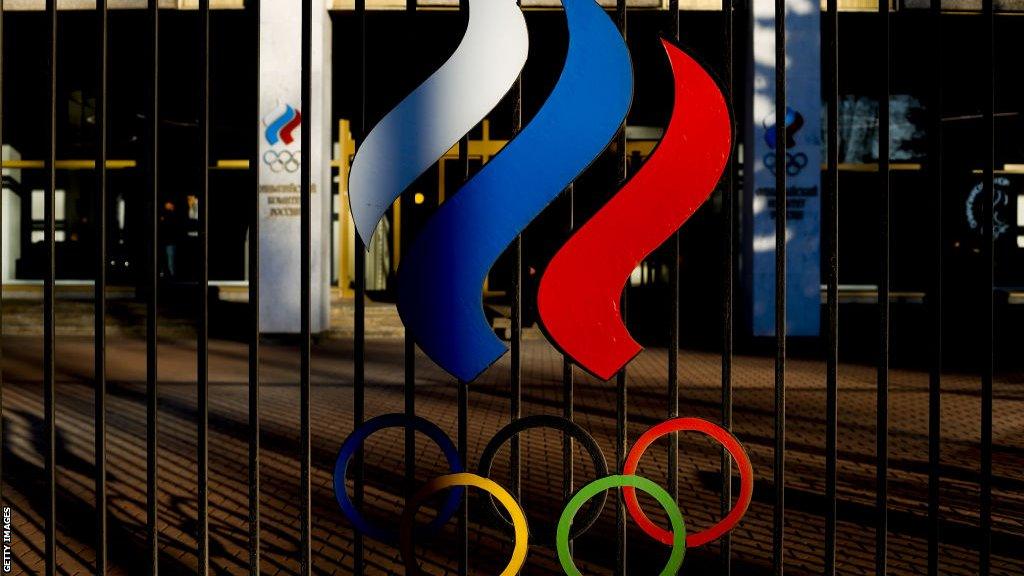Olympics 2024: Ukraine should drop threat of boycott - IOC
- Published

Russian and Belarusian athletes were allowed to compete under a neutral flag at the 2022 Winter Paralympics
The International Olympic Committee has urged Ukraine to drop threats of boycotting Paris 2024 if Russian and Belarusian athletes compete.
IOC president Thomas Bach has told Ukraine's Olympic Committee that such threats are "extremely regrettable".
In response, Athletes for Ukraine accused the IOC of being "on the wrong side of history".
Ukraine is hoping to gain international support for a ban on athletes from the two countries over Russia's invasion.
The IOC has said it will "explore a pathway" for Russian and Belarusian athletes to compete as neutrals.
Ukraine's sports minister, Vadym Guttsait, who is also president of its Olympic Committee, responded by saying the country could boycott the Paris Games, with several other European nations since also calling for the ban to be upheld.
Ukrainian president Volodymyr Zelensky has said allowing Russian athletes to compete at the 2024 Olympics would amount to showing that "terror is somehow acceptable".
In a letter from Bach to Guttsait, which has been seen by the BBC, the IOC president says comments from Ukrainian officials suggesting allowing Russian and Belarusian athletes would promote the war are "defamatory".
Bach added that threatening a boycott is "premature" because the IOC has not discussed the participation of Russian and Belarusian athletes as neutrals in "concrete terms yet".
He also accused Ukraine of "pressuring" international federations, IOC members and future Olympic hosts "in an attempt to publicly influence their decision making" and claims this has been "perceived by the vast majority of them as, at the very least, extremely regrettable".
Bach said Ukrainian athletes have the "unanimous support" of the Olympic movement and that "we all feel the pain and suffering of the Ukrainian people in this cruel war".
After Russia's invasion of Ukraine in February 2022, the IOC called on sports federations to exclude athletes, officials and teams from Russia and Belarus from international events but Bach has also said he is conscious of the impact such sanctions have on the athletes.
In his letter, he cited a United Nations resolution that said "any form of discrimination is incompatible with the Olympic movement" and two UN special rapporteurs expressing concerns over a total ban on Russian and Belarusian athletes being discriminatory. Bach said these were reasons for considering their inclusion as neutrals.
He added that a boycott would be a "violation of the Olympic charter" and goes against the "fundamentals" and "principles" of the Olympic movement.
In response to Bach's letter, Athletes for Ukraine and athlete association Global Athlete said the IOC "continues to be on the wrong side of history" and had an "inverted stance toward the aggressor and the victim of this war" which they believe contravenes the Olympic charter.
They added that by being so critical of the boycott threat, the IOC is "denying Ukraine's right to sovereignty".
Earlier this month, Latvia, Lithuania, Estonia and Poland all voiced their opposition to the inclusion of athletes from Russia and Belarus, before the Olympic committees of Denmark, Finland, Iceland, Norway and Sweden followed suit.
Poland's sport and tourism minister believes as many as 40 countries could boycott the next Olympics - thus making the whole event "pointless".
The mayor of Paris, Anne Hidalgo, does not want Russia to compete at the 2024 Olympic Games while the war in Ukraine continues.
The UK Government condemned the IOC's plan to look at Russian and Belarusian inclusion as a "world away from the reality of war".
World Athletics stressed that athletes from those countries remained excluded from its events.
The International Paralympic Committee banned Russia and Belarus from the Winter Paralympics in March 2022 - though athletes were allowed to compete under a neutral flag.
Further sanctions were announced across other sports, including football, rugby, Formula 1, cycling and swimming, while Russian and Belarusian tennis players were banned from playing at Wimbledon last year.
Russia was banned from the previous summer Olympics in Tokyo as part of sanctions for doping scandals, though more than 300 athletes across 30 sports were able to compete, representing the Russian Olympic Committee.
Wimbledon is yet to announce if the ban it imposed last year will continue, but Russia and Belarusian players have competed at other Grand Slams, with Belarusian Aryna Sabalenka winning January's Australian Open under a neutral flag.
Bach cited the example of Sabalenka in his letter and said the IOC's discussions on Russian and Belarusian involvement were "in line" with what happened at the Australian Open, with no "flags, national symbols or signs supporting the war" to be displayed.
Ukrainian player Elina Svitolina, who wants Russian and Belarusian players to remain banned from this year's Wimbledon, said "I don't think the neutral flag is changing anything".
Last month, President Zelensky said that "any neutral flag of Russian athletes is stained with blood".

'I hated his comedy': Steve Coogan chats to Nihal Arthanayake about British humour and cancel culture
The rise and fall of the jeweller-turned-criminal: Listen to Gangster: The Story of John Palmer
